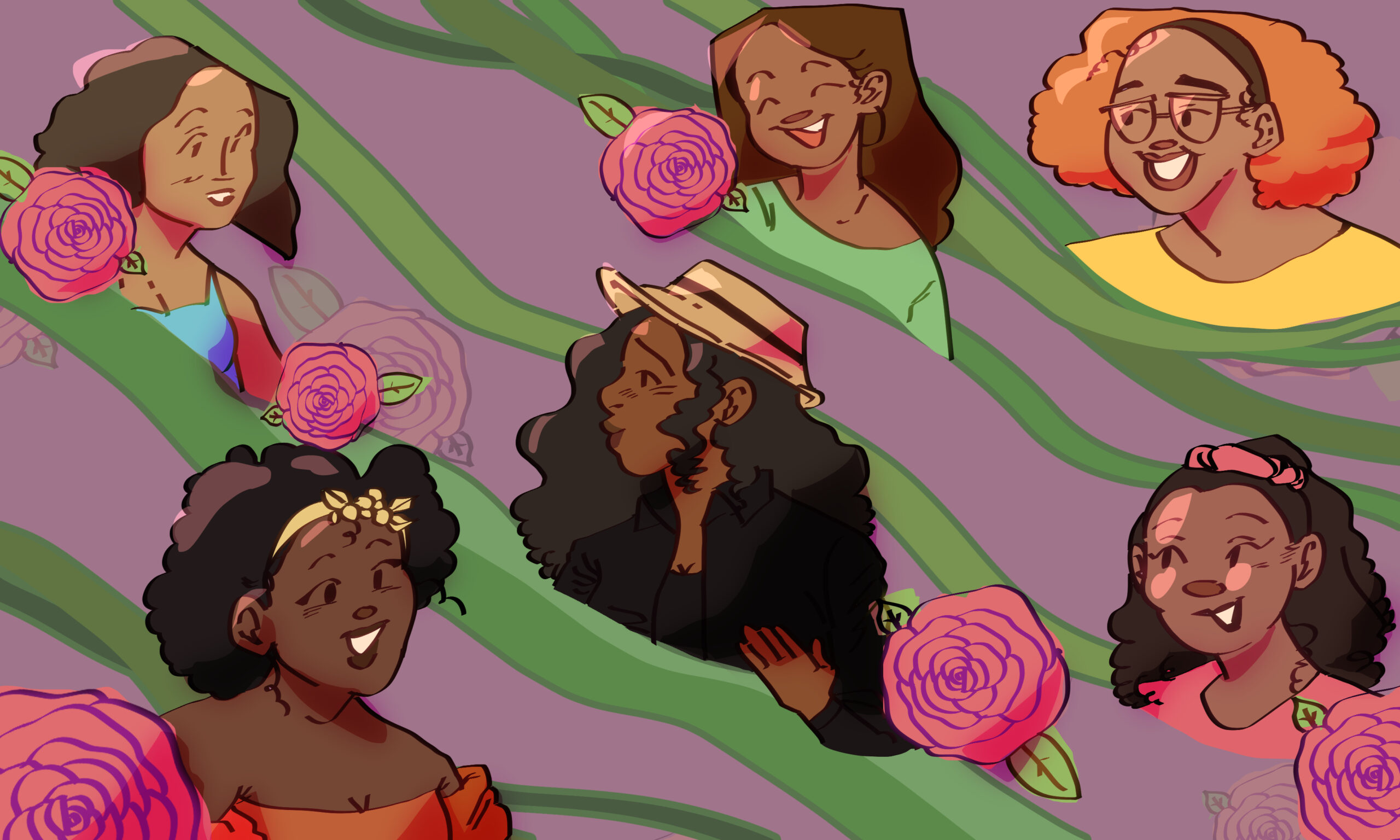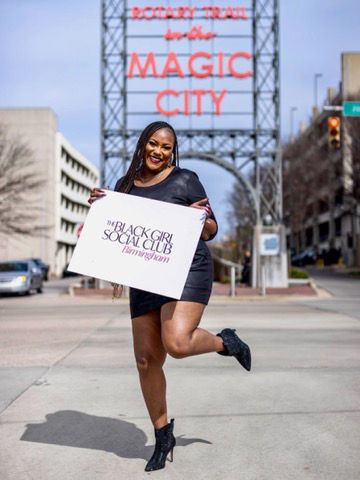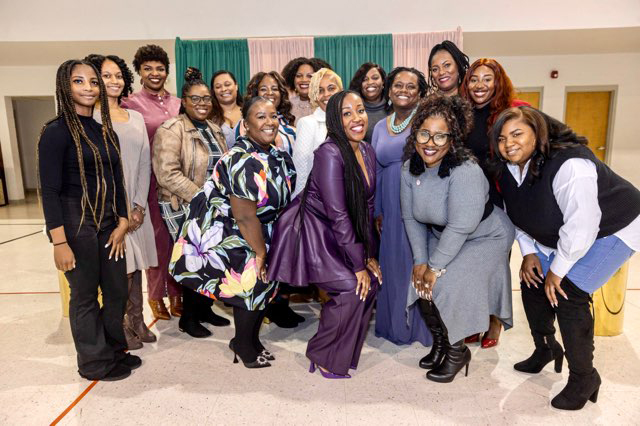
Destiny Alexander / NextGenRadio
home?
Rachel Parker speaks with Delena Chappel about how home for her means creating a safe place for Black women by connecting with them on a personal level – as a mom, as an educator, a professional and the president of the Birmingham chapter of The Black Girl Social Club.
Through social clubs and education, Birmingham woman creates community
Listen to this audio story
Click here for audio transcript
DELENA CHAPPEL: Hi, my name is Delena Chappel. Last name Chappel: C-H-A-P-P-E-L.
I view home as a safe place. Home is a place that you can actually block out everything that’s going on, no matter what it is – socially, professionally, whatever. I just view home as “this is where I can be myself.”
As a Black woman, me to help someone else and identify with them, I’ve always wanted to be that person – that vessel – to make people know, to share my story, very patient about that. To share my story, how personal it may be. I want to share for someone that I feel needs it, and I do that.
I’ll start with me being an instructor here at Jeff State. I have so many different students coming from every different avenue, from every different career lane that they have experienced. And now they come here and they want to learn something new.
And of course my external family, outside of my “family” family, would be The Black Girl Social Club. That organization has been a game-changer for me. I have definitely made connections, and not only have I deposited something to them, they’ve deposited something in me.
So I try to cultivate that into my experiences and tell them about challenges. We have some women that are pursuing new lanes – motherhood, going into marriages, maybe coming out of divorces, whatever it may be, though, again, those are challenges, but we can overcome those.
And I feel like that’s just a power of energy. And when you have that sense of energy to say, “I can do it,” and it’s in the back of your mind, I feel this like a force and it kind of follows you and pushes you through, regardless of what you may see in front of you.
So the connections that gives me that sense of family and safe space. I have a family full of – my mom has three sisters – so full of women. I had one, two, three, four women, plus my grandmother, to always answer to. We were a very close-knit family. So when anything – accomplishments that I made, anything that I did that was not of favor, that I got in trouble with – I had to answer to all four of them. It was just not my mom. So I had a conversation and consultation with every last one of them. And I had to go back to them so many times and say “y’all were right.”
All of that has helped me to kind of prepare for my choices of career. I know I want to do something to reflect what I have learned from my family, what’s been instilled in me, and to help.
What I’m gaining from helping someone: I love to see the eyes of a person where the light actually comes on. I love to see when they uncover that, or they have that sense of feeling comes over that, “I get it.” So I’m gaining just a sense of peace, or a happiness, per se, to say I’m glad I had some footprint in helping.
And so, you know, I’m just, it’s just a feeling of joy and happiness that I’m able to accomplish that with them. Mhm.
Delena Chappel wears many different hats. She’s an instructor at Jefferson State Community College, teaching professional skills in an adult education program, and takes her career seriously as a medical billing/coding specialist. She’s also a mother and the president of the Birmingham chapter of The Black Girl Social Club. She uses these “lanes,” as she calls them, to connect with people on many different levels.
Image 1: Delena Chappel is an instructor at Jefferson State Community College in Birmingham, Ala. She’s sitting on-campus in front of a marker sign on May 1, 2023.
Image 2: A marker sign at Jefferson State Community College in Birmingham, Ala., on May 1, 2023.
Rachel Parker / NextGenRadio
Home for her is a place where she can feel safe and be herself. She’s able to recreate this for others because of how she was raised – with her mom, three aunts and grandma she was accountable to. Every choice would be carefully thought about, because of how the result would reflect on her, along with her family.
“Accomplishments that I made, anything that I did that was not of favor, that I got in trouble – I had to answer to all four of them. It was just not my mom. So I had a conversation and consultation with every last one of them,” she said. “I want to do something to reflect what I have learned from my family.”
She grew up in Philadelphia but moved to Birmingham as a teenager. She always had family in the South, so it wasn’t unfamiliar territory, but it was a shift culturally. Seeing the differences in treatment or attitudes toward minorities wasn’t something she was used to and only added to her work to be inclusive to everyone.

Delena Chappel, Birmingham chapter president of The Black Girl Social Club.
Courtesy of Delena Chappel
Helping is a recurring theme for Chappel. It has deep roots with her family, specifically her mother, who was born and raised in Montgomery, Alabama, and involved in the Civil Rights Movement marches.
“She was in the actual walks,” Chappel said. “Where they actually stood in and said, ‘We’re not going, we’re not coming’ – whatever the situation. My mom was deeply rooted into that because she was there during her high school years.”
Building upon this foundation, Chappel works to instill these values in her students. Through encouraging words and sharing of her own life experiences, she shows and strengthens their connection beyond just instructor and student. She said she got proof of this just a few weeks ago at the store. A student came up to her and said, “‘Miss Chappel, I passed [just] as you told me!’” she said. “It brings me back to why I started doing teaching.”
Chappel is also heavily involved with The Black Girl Social Club. It’s described as a safe space for Black women and it holds a special place for her.

Delena Chappel, Birmingham chapter president of The Black Girl Social Club.
Courtesy of Delena Chappel
Although it’s been some time since I’ve moved here, I finally found a place where I can actually feel that this is something I’ve been looking for.

Delena Chappel (back row, second to right) is the president of the Birmingham chapter of The Black Girl Social Club. Along with the organization founder, Carmen Jones Aziz (front row, second to left), they attended a Church and Brunch at Calvary Christian Resurrection Church in Birmingham, Ala., on Jan. 29, 2023.
Courtesy of Delena Chappel
“Although it’s been some time since I’ve moved here, I finally found a place where I can actually feel that this is something I’ve been looking for,” she said. “And, you know, kind of not knowing what it is that was missing.”
As president of the Birmingham chapter, Chappel has gained a sense of community within her organization. Being surrounded by other like-minded Black women contributed to her sense of purpose. Engaging with her social club has been another family for her: One to learn from, and one to learn with.
“Every woman that has come into our chapter and every leadership event that I have had … I have definitely made connections, and not only have I deposited something to them, they’ve deposited something in me,” she said.
This reciprocal relationship includes her volunteer work, social outings and educational seminars – all for the benefit of Black women. Each event solidifies her belief in the integral role Black women play in their communities.
“We are the most important part in our households,” she said.


